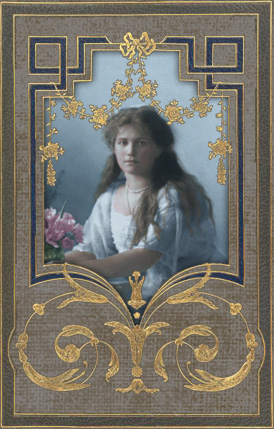Learn more about Pallasart Web Design's Creative Talent - Meet Our Team of Programmers and Designers







CHAPTER 28
THE RUSSIAN CLERGY
THE RUSSIAN CLERGY. THE Greek Church, which is established in Russia, is supposed to hold a place between the Protestant and Roman Catholic churches; it is, however, in ritual and doctrine, more like the latter than the former, though orthodox Russians as a rule prefer Protestants to Roman Catholics. The Greek Church denies the supremacy of the Pope, its clergy are married, Mass is sung in the vulgar tongue, and it does not hold the doctrine of the Immaculate conception.
Many of the priests are excellent men, working hard for the good of their people and leading self-sacrificing lives, true ornaments to the Christian profession; on the other hand, many of them seem to be devoid of any sense of morality. In many respects their lives are very sad, they are so cut off from all others. They are simply peasants and to the level of peasants their younger sons often sink, consequently they are not received into any society. Their education, training and priestly office lift them above the level of the mere tiller of the fields who looks upon the priests with a sort of superstitious awe on Sundays, but on whose life they exercise no influence whatever. The eldest son, or priest, is set apart for the priesthood and no military service is required of him, but the younger sons frequently serve as common soldiers. The groom who led little Anastasie Nicolaivna's donkey was the son of a priest and no one considered it at all an extraordinary thing that he should serve in the stables; in fact, he was considered as being very lucky to have got such a good position and so pleasant a life. He had served as a private in the army and could read and write.
A priest is obliged to marry before he receives orders; his wife is in many cases chosen for him by the bishop; should she die he has to give up his charge, take leave of his children, and go into a monastery, a second marriage being absolutely forbidden to him and a priest .without a wife is not allowed to live in a parish. From the monasteries promotion comes. What the life is there I cannot tell but it must be frightfully monotonous. The brothers do a great deal of wood-carving, some of which is very beautiful. In all the monasteries one can buy for a few pence little wooden spoons carved by the brothers; these have all got" A sign of the blessing" on the top. The right hand is extended, the first and second fingers joined to the thumb and the other two fingers turned in. I have several of these spoons in my possession; I always thought it such a pity to shut up men of education, who might labour for the welfare of their fellow-creatures in a monastery, to eat out their lives carving wooden spoons, but the Russian Church moves very slowly. While I was in Russia a conference was held to discuss the desirability of altering the calendar, which is thirteen days behind the rest of the world, but the Church would not hear of it, alleging that a Christian feast, such as Easter, should not be kept on the same day as the Jewish Passover!
Priests' daughters are educated at excellent institutes set aside for themselves.
On the completion of the education of a priest's daughter, should she not be already engaged, her photograph is taken and sent to all the theological schools to be inserted in the public album. On the back are written full particulars as to her height, age, parentage, fortune, number of brothers and sisters, etc. Should a man not have formed any previous engagement, on the passing of his final examination he goes to the album and looks up two or three suitable candidates for matrimonial bliss, writes to the fathers of the chosen few and an interview is arranged for. When suited, he writes to the fathers of the others, and tells them on whom his choice has fallen and no one is any the worse. Should his wife's father die, he takes his mother-in-law to live with him.
While I was in St. Petersburg a priest died and left four unmarried daughters; in accordance with the usual custom the bishop appointed to the vacant charge a young man whose affections were free, and it was supposed that he would marry one of the daughters and provide for their mother. One after the other of these brave girls refused his offer, not that they had anything against the man, but they said they wished to have some choice in the matter and did not wish to marry where they did not love.
They left their father's house and taking their mother with them they started a school where they are doing well. I sympathised deeply with them and spoke to a Russian lady of their courage in thus defying convention and starting out in the world for themselves. She, however, took quite another view of the matter and said, "What do they suppose they have been brought up and educated for; it was their plain duty to marry priests and I have no patience with people who will not perform their duty. Where are priests to look for wives if priests' daughters refuse to marry them? "
If a priest has daughters and no son, he has to educate a young man for the sacred office in order to marry him to one of his daughters; should he have no children at all he is obliged to adopt a son.
The Empress is doing all in her power to raise the social standing of the priests and to provide them with a settled income.
When a Russian family visits Holy Moscow it is considered correct to hire a priest to say matins, and accordingly a servant-man is sent to the market-place to hire. The priests stand there, each one with a little roll of bread in his hand. The servant chooses his man, and then begins the horrible bartering without which it seems impossible to conclude any bargain. The priest will ask perhaps five or six roubles; the servant will endeavour to get him cheaper. Should the priest be getting the worst of the encounter he will sometimes say something like this: "If you won't give me my price I'll take a bite of this bread, and then it will all be done," for a priest cannot celebrate mass unless he is fasting. Should the servant be new to the business he will probably give in and conclude the bargain; but if he is wide awake he will answer something like this: "For that matter you may eat it all. There are plenty more priests in the market." But suppose the bargain concluded! On the conclusion of matins the priest holds up the cross and all the worshippers press forward to kiss it and the hand of the priest, who is then sent to the kitchen to breakfast with the servants.
It. is related of the late Emperor that being in the country for military manceuvres he attended divine service in the village church. On the conclusion of the Mass he advanced to kiss the cross and the priest's hand. The latter withdrew his hand, saying, "It is not meet that your Majesty should kiss the hand of his humble servant." The Emperor reproved him in these words: "Thou fool, it is not thy hand I kiss but the holy office thou holdest. I do it not for thee but for my people."
Holy pictures and relics hold a great place in the Russian Church. In the cathedral in the Winter Palace is a dried human hand. It is very old. Tradition says that it is the hand of John the Baptist!
Holy pictures may be either painted or carved, but are always hand-work, though they may only cost a few kopecks each. The Russian never speaks of buying or selling these pictures. They are always exchanged. Exchanging for money is not the same thing as buying, they say.
Some pictures are used something like charms. There is one of three saints, Iger, Saumon, and Ivava. With this image engaged couples are usually blessed by their parents before the marriage. If an unengaged person is given the image, he or she is certain, so the fable goes, of being married before the year is over. I gave a copy of it to a girl three years ago but it had no effect; she is still living in single blessedness. I told her she must have failed in faith. As a matter of fact, moved by some feeling of shyness, she shut up the picture in a box and never put it in her little shrine at all. She carried it about with her from place to place, but I really do not think she gave it very fair play. She was a little ashamed of having locked it up, and never could make out whether I had given it to her in jest or seriousness.
One of the Russian nurses got engaged while I was there. When we were last in Moscow she came to me and told me that she had dreamt that an angel came to her and said, "If you wish to be happy in your marriage you must get an icon of Iger, Saumon, and Ivava." She told the angel that she had numbers of holy pictures, would not one of the Madonna do instead?"
But the angel was of a different opinion and said nothing would do but what he had pointed out.
Of course, I told her that if her married happiness depended upon that, to go and get as many as ever she wished; so she dressed and went.
Shortly afterwards the Empress came into the nurseries and asked for her. I told her she had gone out to buy something she required. So the Empress asked me to send the girl to her as soon as she returned. She then showed me a copy of this picture, saying, "It is supposed to bring luck and happiness to brides, I saw it in a church I was visiting and brought it home for her." It was a curious coincidence.
In 1903 a new saint was added to the Russian calendar -- St. Seraphim. He was a monk, and was remarkable for the great gentleness and piety of his character. He lived in a monastery situated in a forest. He is generally represented with a great bear which he had tamed, and which followed him about like a dog. He was deformed. Wandering in the forest one day he was attacked and beaten by a ruffian; his back was broken, but he recovered and lived for some years. Many extraordinary stories are related of him. He only died about seventy-five years ago, but owing to his extraordinary piety, he was canonized far sooner than is usual.
The Emperor and Empress went to the ceremony. They were lodged in the convent there, their suite being accommodated either in the stables, where beds were made up, or in tents. But for the most part the pilgrims, numbering about one and a half millions, slept in the forest or in the grounds of the monastery with the sky for a canopy. The monks were not at all prepared for such numbers, and there was not nearly sufficient bread, or food of any kind, to go round. Many apparently authentic cures are recorded; the blind received their sight, the lame walked, but I cannot say if the cures were permanent.
Talking of them with a Russian doctor, he said he had no doubt whatever of the truth of certain of these cures, but he believed they were all of the nervous system; but then nervous diseases are the most difficult of all to cure. One cure is reported of a young girl suffering from typhoid whose people had taken a cottage in the neighbourhood for the summer. One morning her mother was horrified to find her bed empty. Search was immediately made all over the house and the garden, but she could not be found. Suddenly she walked into the house, quite well, and asked for breakfast. She told the following story: --
In the night a little old man appeared to her, and told her to get up and go and bathe in a spring of water, several miles distant from the house. She protested, saying she had been in bed for several weeks and had not strength enough to walk downstairs, but the apparition said, "Only obey, strength will be given to thee, only have faith." She got up, walked to the spring and bathed, and was quite restored, nor had she a relapse.
On these remarkable circumstances being made known, it was resolved to canonize St. Seraphim, and I am sure that he merited the distinction, owing to the beauty of his life and character.
The Bible tells us that if we have faith all things are possible to us, so I believe that these miracles were worked in answer to faith. Many people walked from Archangel on the White Sea down to the monastery, which is situated in the south of Russia, starting, like the apostles of old, without provision for the journey. Many people were walking for six months.
Two brothers set out carrying their paralysed sister in a stretcher between them and made their way on foot to the shrine. Their journey took them over five months. They begged their way; underwent in credible hardships. Starting on their long, toilsome journey in March, when every place was frozen hard, they travelled on through snow, under the burning sun, still carrying their helpless sister, sustained by the hope of a blessing for her. Their faith was rewarded. Their sister was restored. Charitable people helped them to return home by train. They had the three greatest things in the world, faith, hope and charity, and they were rewarded.



